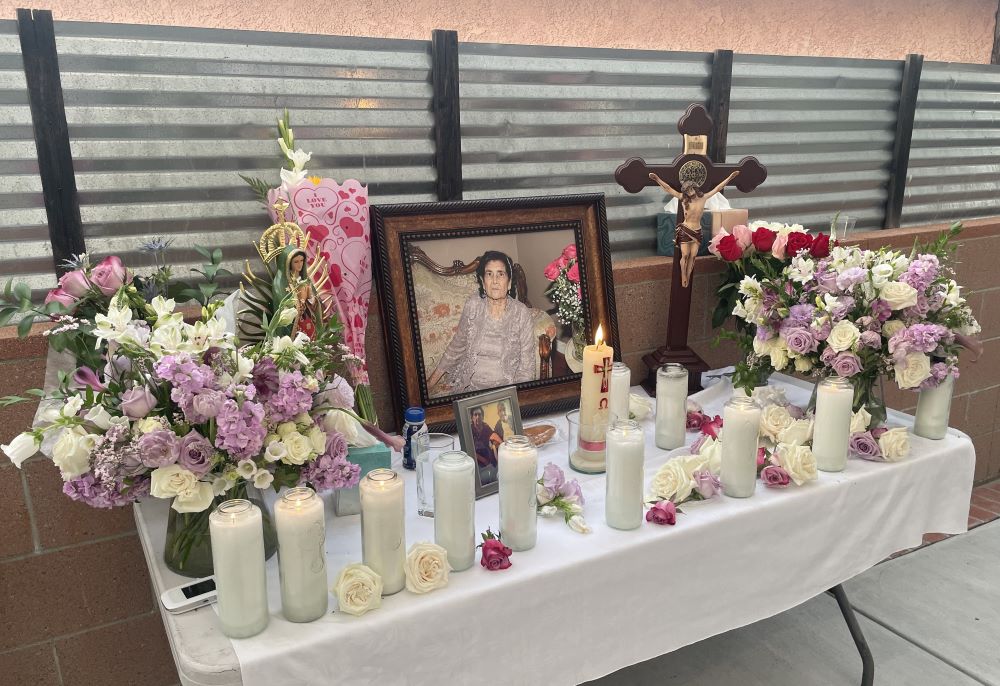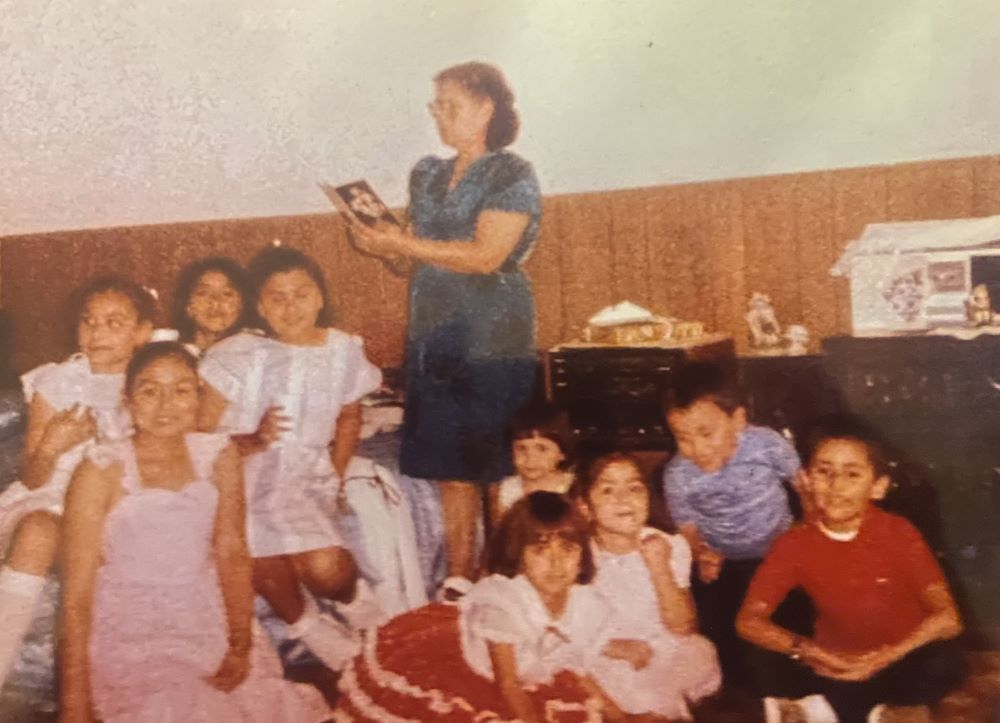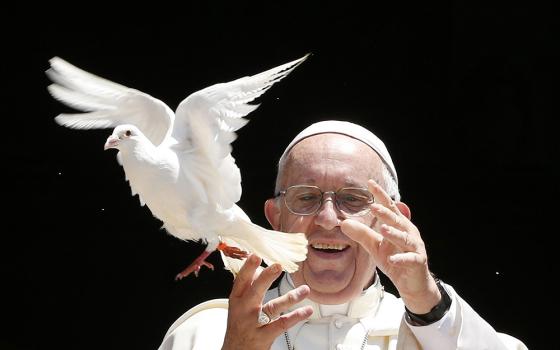
The Arellano family set up this shrine during their novenario for Gustavo Arellano's grandmother, Angelita Arellano Pérez, who died July 15 at age 100. Her descendants include eight children, 32 grandchildren, 70 great-grandchildren and 21 great-great-grandchildren. (Gustavo Arellano)
We were sad, we were happy, we were hungry. We were 300 people, gathered at Torres Banquet Hall in East Los Angeles Aug. 3 to cap two weeks of mourning for my paternal grandmother, Angelita Arellano Pérez, who died July 15 at age 100 from complications from a stroke.
We descendants — eight children, 32 grandchildren, 70 great-grandchildren and 21 great-great-grandchildren — had celebrated her life by falling back on the Catholic faith in which Grandma had raised us.
She attended Mass every Sunday she could — first, in the small chapel in her hometown of Jomulquillo, Zacatecas, Mexico, then at St. Alphonsus in East Los Angeles. When the COVID-19 pandemic hit the world, my cousins taught Grandma to stream services from a laptop, which she continued to do any time she was bedridden with illness or injury.
Faith, you see, was her bedrock. It helped her raise four boys and four girls, each of whom migrated to the United States and achieved their American dream. It saved her when she was left a widow at age 67 after my grandfather José — whom we all called Pepe — died of a heart attack in 1985 in Mexico while she was in the United States. It brought Grandma community and friends and a reminder that life is never about you, but the people you love.
Faith was all over the tiny flat behind my Tia Nacha's home in East L.A. where Grandma lived. A painting of the apostles hung over her small kitchen, where she prepared meals well into her 90s and spoon-fed successive generations of toddlers, warning us all to finish our food lest we disappoint Jesus and his Twelve. Grandma's tinier bedroom had statues of Jesus, St. Jude Thaddeus, angels, multiple Virgins of Guadalupe and a simple crucifix next to an alarm clock in front of a painting of the Santo Niño de Atocha, the apparition of the infant Jesus that's the patron saint of Zacatecas.

Gustavo Arellano's grandmother, Angelita Arellano Pérez, prays the rosary to a gathering of her grandchildren in the 1980s. Gustavo is pictured wearing a blue shirt, second from the right. (Courtesy of Gustavo Arellano)
Whenever we visited her, she'd give us a bendición — a blessing — while she made the Sign of the Cross. But Grandma wasn't a persinada — a holier-than-thou scold. She knew that her progeny weren't as faithful to the church as she — and that some had even left altogether. That's why she emphasized that we at the very least love and support each other — but yeah, get closer to God if you can.
When we celebrated her 100th birthday last fall, we started with a special Mass at St. Alphonsus, which had hosted dozens of family baptisms, quinceañeras and weddings over the decades. It would also be where we would hold her funeral.
In the weeks leading up to it, we hosted a novenario — a novena mixed with grand feasts after each one that I thought all Catholics did but apparently is a Mexican Catholic tradition — at the house of my cousin Angie, who lived just a few doors down from Grandma. We recited the rosary but also sang some of Grandma's favorite hymns, such as "Entre tus Manos" ("In Your Hands") and "Señor me has Mirado a los Ojos" ("Lord, You Have Seen My Eyes"). It brought us together in spirit, and girded us in God.
A week after the last one, we finally held Grandma's funeral service. A cousin from each branch of the Arellanos, myself included, served as pallbearers. We sang the 23rd Psalm, and heard the story of Lazarus. My cousin Ramiro — whose mother died in childbirth and whom Grandma raised as her own son, a love Ramiro returned by living with her until the end — read in Spanish from the Book of Wisdom, specifically the passage that states, "The souls of the righteous are in the hand of God, and no torment will ever touch them."
We then went to nearby Calvary Cemetery to bury Grandma in a mausoleum. There, a priest unfastened the four small statues of the Virgin of Guadalupe — my grandmother's patron saint — that stood at each corner of Grandma's casket and presented them to my uncles. Many of us clasped onto the small rosaries my cousin Angie had handed out as keepsakes on the last day of our novenario for Grandma.
When we finally arrived at the Torres Banquet Hall, photos of each branch of the family with Grandma adorned the tables next to the buffet line of fajitas, chile rellenos and enchiladas before us. This would be our final goodbye to Grandma.
Advertisement
We ate, we shared stories, we all caught up. Then toward the end, my cousin Chely grabbed a mic and told us about our matriarch's life, which we all knew. But she also had a surprise: A couple years ago, our younger cousin, Crystal, had recorded Grandma talking about her life.
Now, we were going to hear a snippet. What could she possibly have said?
"All of you should get closer to the church," Grandma said in Spanish, in her unmistakable, proud voice that never wavered even in her final weeks. "The priest has said many times that when people don't attend Mass, don't take Communion, don't do confession — most people don't even return after they take their first Communion — you won't go directly to heaven with God.
"First you go to purgatory," she continued. "And we pray for you here. And we take [you] out of purgatory, and then you can go to heaven."
Chely's jaw dropped, and so did ours. The recording continued — now, Grandma wanted to talk about burials.
"If there is eternal life, why do some people believe that we die?" Grandma told Crystal. "In this world, the body is buried, but your spirit doesn't [get buried]. Your soul goes to heaven, and the body stays buried. Who cares" what happens to your corpse?
Damn, Grandma!
Grandma wasn't done. She mentioned that her oldest son, my Tío Gabriel, wanted to be cremated.
"I tell him, 'Why do you say that?' 'Mom, because the worms will eat me if my body is in the ground.' "
A beat.
"Well, who cares if the worms get to you?" Grandma continued. "You won't notice! You won't know! You're not going to know or feel the worms, so who cares?"
We all howled in laughter. My Tío Gabriel sheepishly grinned.
Then came the kicker: "After I raised a family of eight, they're going to pay me with cremation?" She laughed. "No, they better bury me!"
The recording lasted only two minutes, but it was the perfect way to end our period of mourning. We applauded our Grandma, a daughter of God, a mother to us all, a Catholic even after death.
Especially after death. May we all follow in Grandma's grace.






